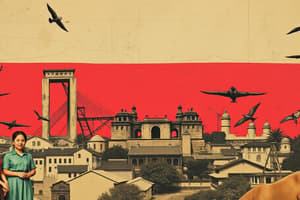Podcast
Questions and Answers
What is the primary focus of Social History?
What is the primary focus of Social History?
- Documenting the history of science
- Studying past connections among different cultural groups (correct)
- Analyzing economic trends throughout history
- Exploring historical events related to wars
In the context of Economic History, what role do historians play?
In the context of Economic History, what role do historians play?
- Tracing the evolution of economic systems and trends (correct)
- Analyzing the impact of environmental changes on society
- Highlighting significant breakthroughs in art movements
- Focusing on documenting diplomatic relations between nations
Which field of study focuses on the analysis of artistic movements and cultural expressions?
Which field of study focuses on the analysis of artistic movements and cultural expressions?
- Political History
- Environmental History
- Art History (correct)
- Social History
What aspect does Diplomatic History primarily deal with?
What aspect does Diplomatic History primarily deal with?
Political History mainly focuses on which of the following?
Political History mainly focuses on which of the following?
Which branch of history is concerned with analyzing the intellectual developments and ideas over time?
Which branch of history is concerned with analyzing the intellectual developments and ideas over time?
Which type of source is the Minutes of the Commonwealth Constitution Convention of 1935?
Which type of source is the Minutes of the Commonwealth Constitution Convention of 1935?
What type of source would a book analyzing and interpreting the Philippine Revolution of 1896 be considered?
What type of source would a book analyzing and interpreting the Philippine Revolution of 1896 be considered?
Which of the following is an example of a primary source related to the Philippine Revolution of 1896?
Which of the following is an example of a primary source related to the Philippine Revolution of 1896?
What is the importance of scrutinizing historical sources according to the text?
What is the importance of scrutinizing historical sources according to the text?
Why is conducting external and internal criticism important for historians when assessing sources?
Why is conducting external and internal criticism important for historians when assessing sources?
In what way do secondary sources differ from primary sources?
In what way do secondary sources differ from primary sources?
Why do historians need to be objective and impartial?
Why do historians need to be objective and impartial?
What is the main focus of Postcolonialism in relation to identity?
What is the main focus of Postcolonialism in relation to identity?
Why is it problematic that history is always written by victors?
Why is it problematic that history is always written by victors?
What is the role of the historian according to the text?
What is the role of the historian according to the text?
How did the Annales School of History differentiate itself?
How did the Annales School of History differentiate itself?
Why is it important for historical research to have rigor?
Why is it important for historical research to have rigor?
Flashcards are hidden until you start studying
Study Notes
Definition and Subject Matter of History
- History is the study of the past, derived from the Greek word "HISTORIA" meaning "knowledge acquired through inquiry or investigation."
- It is a discipline that has existed for around 2,400 years, as old as mathematics and philosophy.
- Historians traditionally focused on writing about wars, revolutions, and other important breakthroughs.
Branches of History
- Political History
- Social History
- Economic History
- Art History
- Diplomatic History
- Cultural History
- Intellectual History
- Environmental History
- History of Science
- Women’s History
Questions and Issues in History
- Historiography is the history of history.
- History unites a nation by forging a sense of collective identity through collective memory.
- Lessons from the past can be used to make sense of the present and to avoid repeating mistakes.
Positivism
- Requires empirical and observable evidence before claiming a particular knowledge is true.
- Historians are expected to be objective and impartial.
Illustrados and Postcolonialism
- Illustrados wrote history intended for the Spaniards.
- Postcolonialism grapples with creating identities and understanding societies against the shadows of colonial past.
Problems Confronted by History
- History is often written by the victors, biased towards the powerful and dominant players.
The Historian's Job
- A historian's job is not only to seek historical evidence and facts but also to interpret those facts.
- The historian gives meaning to the facts and organizes them into a timeline.
The Annales School of History
- A school of history born in France, marrying history with disciplines like geography, anthropology, archaeology, and linguistics.
- Notable Annales scholars include Lucian Febvre, Marc Bloch, Fernand Braudel, and Jacques Le Goff.
Historical Sources
- Historical sources are a historian's most important tool.
- Sources can be classified into PRIMARY SOURCES and SECONDARY SOURCES.
Primary Sources
- Produced at the same time as the event, period, or subject being studied.
- Examples include:
- Commonwealth Constitution Convention of 1935 Minutes of the convention
- Newspaper clippings
- Philippine Commission Reports of the US Commissioners
- Records of the convention
- Draft of the Constitution
- Photographs of the event
- Eyewitness accounts
- Archival documents, artifacts, memorabilia, letters, census, and government records.
Secondary Sources
- Produced by an author who used primary sources to produce the material.
- Examples include:
- Teodoro Agoncillo's "Revolt of Masses: The Story of Bonifacio and the Katipunan" published originally in 1956.
Studying That Suits You
Use AI to generate personalized quizzes and flashcards to suit your learning preferences.




